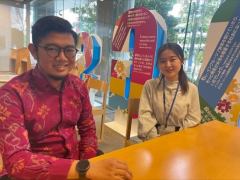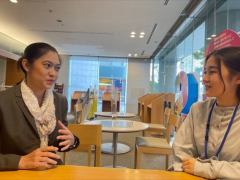Interviews for participants of the Comprehensive DRR course
2023.03.07
JICA offered Comprehensive DRR course from 12th Jan to 23rd Feb. The aim of this course is to formulate disaster prevention plan and promote the investment in DRR to reduce the risk of disasters through learning Japanese experience and local disaster risk reduction plans. The participants learned 8 STEPs for the planning of local DRR. A university student working in JICA Kansai as an intern interviewed two participants. *DRR(Disaster Risk Reduction)
Mr. Adi is in charge of planning DRR related policy in the Ministry of National Development Planning, Directorate for Spatial Planning, Land Affair, and Disaster Management in the Republic of Indonesia.
-Could you tell me about the natural disasters in your country?
In Indonesia, earthquakes and Tsunami often happen. There is no big difference in types of natural disasters between Japan and Indonesia. However, Japanese people know how to face them well compared to Indonesians.

-Why did you decided to take this course?
I thought this course would give me good opportunities of learning earthquakes and Tsunami. I thought it would be good experience of thinking about what I should do as an officer who work for disaster management when earthquake and Tsunami happen in the future.
-What was the most useful program?
The lecture about awareness to earthquakes in a community were useful. I joined” Iza! Mi Kaeru Dai Caravan 2023*” in 29th Jan, which impressed me so much, and I was really interested in activities which is for promotion of raising awareness of DRR for local community. Such events can teach DRR not only to children but also their parents. Children who were born after 2004 when Indian Ocean earthquake and tsunami happened do not know about earthquake in detailed, so these events essential for disaster education.
*”Iza! Kaeru Caravan“ is an event which provide local people, especially children, study program about DRR. Children can study about how we can reduce the risk of disasters with fun.
- How did you change your ideas through this course?
I experienced disaster such as flood, therefore I did not change my ideas for disasters a lot. However, I could make better plan to reduce the damage by disasters through this course, and this program made me realize the importance of community partnerships again.
Ms. Suthathip works as a plan and policy analyst for the Department of Disaster Prevention and Mitigation (DDPM) in the Ministry of Interior in Thailand.
-Could you tell me about the disasters in your country?
Thailand experiences several disasters, with floods and droughts being the two major types. Low-lying areas often experience flooding during the country's rainy season, which lasts from May to October. Also, droughts can occur in the dry season, which lasts from November to April. In 2011, Thailand experienced its worst flood in recent years. The flooding was caused by an unusually heavy monsoon season that lasted several months and overflowed rivers and dams. Millions of people were affected by flood damage to their homes, businesses, and infrastructure. Additionally, the 2004 Indian Ocean earthquake and tsunami was a major disaster that affected many countries in the region, including tourist destinations in Thailand. When the tsunami struck on December 26, many western tourists and Japanese were vacationing in the affected areas of Thailand during the Christmas holiday.

-Why did you decided to take this course?
Japan has a long history of dealing with disasters, including earthquakes, tsunamis, typhoons, etc., so it has developed advanced technologies and disaster management systems to deal with them. This has led to Japan being recognized as a global leader in DRR. Moreover, JICA course offers an opportunity for international networking and collaboration, allowing participants to share their own experiences and challenges in this field.
- What was the most useful program?
All lectures and activities provided comprehensive knowledge of DRR. A workshop conducted by great teachers on "8 steps“, a method of developing local DRR plan was particularly insightful. In the workshop, participants developed their own local DRR plans for their selected areas, which helped me better understand the linkage between local and national DRR.
We also visited Aso city, in Kumamoto prefecture, where we learned about landslide countermeasures and flood control measures. In Shirakawa river, construction work was carried out to widen the watershed to prevent flooding, and, trees and other plants were planted using traditional methods. We gained insight into the use of artificial and natural objects for disaster mitigation, which were kind of Ecosystem based Disaster Risk Reduction. (Eco-DRR)
- How would you like to utilize knowledge which you gained in this course?
I am personally interested in Eco-DRR, which focuses on utilizing and conserving natural resources to reduce the risk and impact of disasters, and I intend to initiate a project related to Eco-DRR soon. It is a great opportunity for me to learn about Comprehensive Disaster Risk Reduction here in Japan.
scroll